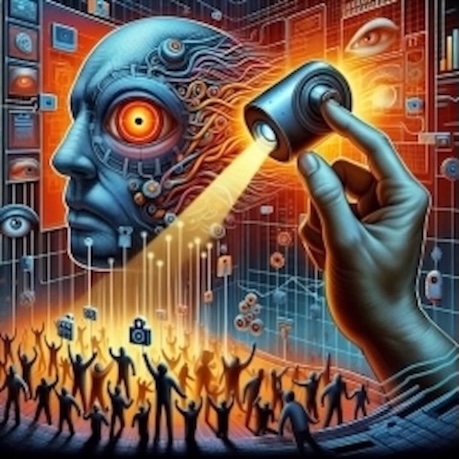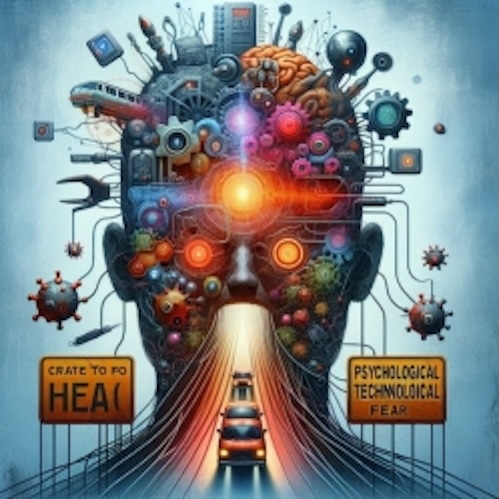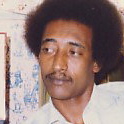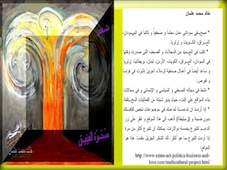Psychological Technological Fear: How Innovation Fuels Anxiety?
The Psychological Technological Fear - How Innovation Fuels Anxiety? Is It Dystopian, Utopian, or Reality? As technology evolves faster than society can process it, a growing psychological tension begins to surface. This page explores that tension, not as science fiction, but as lived experience. Is our hyperconnected world ushering in a utopia of unlimited access, or a dystopia of surveillance, overload, and alienation? Or does the reality fall somewhere more complex?
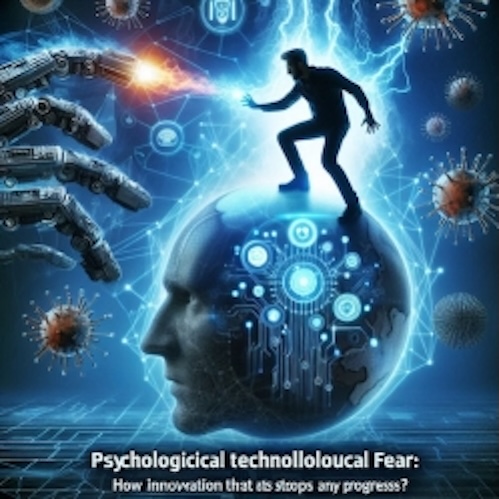 The Psychological Technological Fear - How Innovation Fuels Anxiety?: The Psychological Technological Fear - How Innovation Fuels Anxiety?: A breakaway of innovation narratives in an image - Against a gradient from dark to light blue: a metaphor for mental transition or descent rises a surreal composition: a human head filled with media and tech icons, symbolizing cognitive saturation. A small figure stands atop the head, poised mid-leap, as if trying to escape the weight of information. Nearby, jagged circular symbols and layered icons represent fragmented reality, digital intrusion, and chaotic mental data. This visual echoes the theme of psychological technological fear... the way innovation compresses the mind and pressures identity to flee.
The Psychological Technological Fear - How Innovation Fuels Anxiety?: The Psychological Technological Fear - How Innovation Fuels Anxiety?: A breakaway of innovation narratives in an image - Against a gradient from dark to light blue: a metaphor for mental transition or descent rises a surreal composition: a human head filled with media and tech icons, symbolizing cognitive saturation. A small figure stands atop the head, poised mid-leap, as if trying to escape the weight of information. Nearby, jagged circular symbols and layered icons represent fragmented reality, digital intrusion, and chaotic mental data. This visual echoes the theme of psychological technological fear... the way innovation compresses the mind and pressures identity to flee.Through a series of articles, we trace the phases of psychological technological fear from existential dread and surveillance anxiety, to identity crises and economic displacement. Each section invites readers to examine how innovation reshapes not just our devices, but our minds.
Whether you're a skeptic of AI, a survivor of digital burnout, or a thinker concerned with privacy and authenticity, this archive holds space for inquiry and awareness.
Fear as a Weapon: Psychological and Technological Dimensions of Control!
📘 Section: Conventional Narratives
This page is part of the broader section on Conventional Narratives, which includes a series of interconnected pages, each examining how dominant storylines have shaped global understanding, identity, and policy across time. This page joins the larger discussion by focusing specifically on how fear operates within these narratives:
- Breaking the Illusion of Truth: Psychological Liberation & Intellectual Growth!
- Conventional Narratives Are Always Wrong!
- Conventional Narratives Hub!
- Dominant Perspectives Shape Our World!
- Established Frameworks Invisible Forces!
- How Established Opinions Shape Perception?
- Illusions of Institutional Narratives!
- Mainstream Ideologies Shape History!
- Media Driven Fear Narratives!
- Mind's Intellectual Property: A New Name for an Ancient Freedom!
- Origins of Misleading Narratives!
- Politics of Myths and the Invention of Legitimacy!
- Prevailing Discourses Challenge Social Narratives!
- Psychology of Fear Stops Progress!
- Social Norms Shape Consumer Behavior!
- Why Prevailing Perspectives Fail Us?
- Psychological Technological Fear - How Innovation Fuels Anxiety!
- Climate Change Disrupts Dominant Narratives!
- Ethical Journalism Combats Dominant Narratives!
🌍 Interconnection: Global to Local Fear that Fragmented Sudan
Since this section addresses conventional narratives at a global level, it is also tightly interwoven with their impacts at the local scale. A compelling case is Sudan, where fear-laden narratives were not only imported but deeply internalized. These narratives contributed to the unraveling of the social and national fabric, distorting truth and rewriting history in real time. Explore what these dominant destructive narrations have done to Sudan here:
- Personal Encounter with Fear: How Fear Devastated an Entire Country? (Part #1)
- Sudan as a Modern Case Study of Fear-Driven Collapse! (Part #2)
- Fear and Collective Behavior: How Dogma, Nostalgia, and Religion Shaped Sudan’s Destiny? (Part #3)
- Reimagining Progress: How to Overcome Fear on Personal and Collective Levels? (Part #4)
- The Anatomy of Fear: Lessons from Sudan and the Psychology of Change! (Part #5)
- How Islamic Parties Repackaged Belief in Sudan? (Part #6)
- The Janjaweeds Conspiracy and Politics of Myth in Sudan (Part #7)
- The Forces of Freedom and Change Destroyed Sudan (Part #8)
- How Sudan Lost Its African Soul: The Disappearance of Joy (Part #9)
- The Crisis in Sudan is Not Civil War! (Part #10)
- Sudan From International Terrorism Patron to Prosecutor! (Part #11)
- Rising of the Phoenix - From Poetry to the Real Life of a Nation (Part #12)
📜 Rooted in the Past: Tracing Historical Eras
These two sections on global and local fear emerged from a foundational section that chronicles global dynamics across historical eras. It sheds light on the conventional narratives that arose from each period, tracing how fear, power, and perception evolved alongside empires, revolutions, and modern institutions:
Why Expanding Horn Africa to Include Other States and Global Impacts?
- A New Era of Chaos and Distrust is Shaping!
- Pre-Cold War Era of Colonialism & Imperial Rivalries!
- Pre-Cold War American Expansionism!
- The Cold War Era: A Battle of Ideologies and Influence!
- Why Do Nations Fragment When Unity is Their Greatest Strength?
- Eastern Europe Socialist Bloc Fragmentation!
- Sudan and U.S. Policy: A Terrorism Connection? What's The Real Story?
- Eritrea Was Too Late to Independence Due to Colonial Conspiracies!
- Namibian Road to Independence From Liberation to Sovereignty!
- The Post-Cold War Era: A Shifting Global Landscape!
- How Economics, Ideology, and Geopolitics Fragment Nations and Create New Ones?
- New World Order: Stability or Chaos?
- Why Am I Saying A New Era of Disorder and Doubts is Shaping?
- Rewriting History: The Lies We Inherit!
- Global Dynamics Unfold Myths and Map Realism (the Truths)
The Fear Nexus: Psychology, Technology, and Narrative Power you're about to explore is no ordinary form of control, it's a force that shapes how individual minds think. It doesn't serve the interests of people; it serves the interests of power itself. Explore these titles through the sections of the Global Dynamics.
Psychological Technological Fear: wHAT Is It?
This isn't just fear as emotion, it's fear as architecture. Psychological Technological Fear refers to the deliberate shaping of perception through invisible systems and subtle triggers. It is engineered in headlines, embedded in algorithms, amplified across networks, and encoded in public memory. Unlike traditional fear born of immediate threat, this fear is constructed: designed to guide how people think, what they value, and even what they question. It manipulates not only behavior but belief. To understand it is to begin dismantling its grip.
Psychological Technological Fear, sometimes called technophobia in its broader sense has evolved in complex layers throughout history, especially as technology began to shape not just tools, but minds and societies. The fear isn't monolithic; it emerges in distinct phases, each rooted in a different kind of uncertainty. Here's a breakdown of some key ones:
🌀 1. Existential Fear: Loss of Identity or Control
Fear that machines will replace human purpose or creativity...
Concerns that artificial intelligence (AI) will surpass or subjugate humans (e.g. superintelligence, Singularity narratives)
Worries about becoming overly dependent on technology for thinking, decision-making, or emotional regulation.
👁️ 2. Surveillance & Invasion Phase
Fear of being watched, tracked, or manipulated by digital platforms, governments, or corporations.
Leads to anxiety around loss of privacy, digital profiling, and behavioral prediction.
Exacerbated by data breaches, facial recognition, and algorithms that shape public opinion.
🤯 3. Cognitive Overload & Fragmentation
The feeling of being mentally fragmented due to constant notifications, multitasking, and sensory input.
Fear of declining focus, memory, or original thought.
Digital saturation creates exhaustion and withdrawal symptoms when unplugged.
👤 4. Social Identity & Authenticity Crisis
Fear that our real selves are dissolving into digital personas.
Performance anxiety on social media, comparison fatigue, or imposter syndrome.
Erosion of offline relationships and tactile human connection.
🛠️ 5. Displacement & Economic Anxiety
Technological automation replaces jobs and restructures economies.
Fear of irrelevance, obsolescence, or being left behind in a digital meritocracy.
Emotional stress among workers whose skills no longer match market demand.
🌐 6. Mistrust in Reality & Information
With deepfakes, AI-generated text, and synthetic media, fear arises around what's real anymore.
This phase includes panic over misinformation, manipulated truths, and epistemological chaos.
People begin to question the very fabric of trust and evidence.
⚡ 7. Rapid Change Paralysis
Feeling disoriented by the speed at which technology evolves.
Fear of constantly having to adapt, update, or relearn, leading to a freeze response.
Older generations may feel especially alienated, while younger ones feel overwhelmed.
These phases don't always happen chronologically, they often overlap or resurface based on context (war, pandemics, political unrest, AI breakthroughs).
🧠 Psychological Technological Fear: Dystopia, Utopia, or Reality?
A Meditation on the Human Mind at the Edge of Machines:
🕳️ Between the Dream and the Nightmare
Humanity stands at a curious junction, between awe and anxiety. For every marvel of modern innovation, there is an echo of unease. Robots clean our homes, algorithms write our headlines, artificial minds whisper back at us from screens. We call it "progress."
But deep inside, a voice still asks: Should we be afraid of the very tools we built?
Is this fear dystopian fantasy? Utopian paranoia? Or is it simply... real?
🔮 The Fiction That Set the Stage
Technological fear didn't begin with technology itself. It began with imagination.
In literature and film, we dreamed forward through fear:
Frankenstein (1818) warned us of the monster we might create.
Metropolis (1927) showed machines chained to social inequality.
1984, Black Mirror, and The Matrix reinforced one idea: technology, unchecked, will betray us.
These visions weren't just entertainment. They were early psychological rehearsals for our modern anxieties. But they presented binaries: dystopia or utopia, control or chaos, savior or jailor. Reality, however, rarely fits into tidy genres.
🧍 The Human Root of the Fear
What we call technological fear is often a projection of our deeper human discomforts:
Losing control of our surroundings.
Becoming irrelevant in systems we don't understand.
Watching society change faster than we can adapt.
Being watched, manipulated, or replaced.
This fear isn't irrational. It's existential. And it doesn't require flying cars or killer robots to be valid. All it takes is one morning where your phone knows your thoughts before you've voiced them.
⚖️ So... Is It Dystopian?
Not entirely.
Dystopia is a literary exaggeration, but our daily lives already contain micro-dystopias:
Governments scanning social media to score citizens.
Algorithms controlling job offers, insurance rates, even judicial sentences.
Children raised on screens that memorize more about them than their teachers do.
No apocalypse required. Just slow drift.
🏗️ Is It Utopian, Then?
Only in promise.
Proponents of "techno-utopia" envision:
A world with no disease, thanks to biotech.
A society without labor, thanks to automation.
A global brain of unity, thanks to interconnectivity
But utopias assume equity, and technology does not distribute itself fairly. In fact, it often amplifies the gaps it promises to close. And so utopia remains a dream written mostly by those already privileged.
🌐 Reality: A Third Path
So what is it really?
Psychological technological fear is not a fantasy. It's a mirror.
It reflects how we feel when confronted with acceleration, surveillance, replacement, and loss of meaning. But fear doesn't mean we must retreat, it means we must navigate.
The solution is not to romanticize the past or worship the machine. It is to humanize the system, to question its values, to design with empathy, and to center justice in progress.
🔦 What We Must Ask
Instead of asking if fear is irrational, we should ask:
Who benefits from dismissing it?
Who is harmed when we ignore it?
How can we design technology that speaks with people, not at them?
Because fear, when examined, becomes ethics. And ethics, when applied, becomes hope.
✍️ Final Thought
Technological fear is not dystopian. It is not utopian. It is a human reaction to an unbalanced evolution. The question isn’t whether we're right to fear. The question is: What kind of world do we want to build while we're still awake enough to choose?
🧠 When the Machine Threatens the Mirror!
The Existential Phase of Psychological Technological Fear
🌌 More Than Just Fear of Machines
Not all fear of technology is about buttons, wires, or dystopian headlines. Sometimes, it's about something much deeper, something intimate. It's the fear that what makes us human is being quietly displaced.
This is the existential phase of technological fear.
It doesn't announce itself in panic. It creeps in, slowly. A quiet unease as artificial intelligence answers questions faster than we can think. A subtle sorrow when digital assistants seem to know our habits better than our partners. A pause, when we wonder if our decisions are still our own.
This isn't fear of machines. It's fear of erosion.
🤖 When Intelligence Becomes Artificial, Does Humanity Lose Definition?
For centuries, human beings measured themselves by their ability to reason, create, and reflect.
But today:
Machines compose music, write poetry, and edit novels.
Algorithms "learn" and predict human behavior.
Chatbots simulate empathy with words like "I understand" and "Tell me more…"
So the question whispers louder: If machines do what we once believed only we could, what are we now?
It’s not arrogance to ask this. It's psychological survival. We are looking into a mirror that no longer reflects something entirely ours.
🧭 The Loss of Control
Closely tied to identity is the fear of losing agency.
From self-driving cars to automated justice systems, humans are increasingly removed from the loop:
Who decides when an AI model predicts criminal risk?
What happens when medical diagnoses come from algorithms we can't audit?
Who's accountable when we can't explain what the machine learned?
The deeper fear here isn't just about being replaced. It's about ceding control to systems we didn't elect and can't fully understand.
🕊️ And Yet… This Is Not the End of Meaning
Existential fear is not a flaw, it's a signal. A signal that says: Pause. Reclaim the mirror.
We are not obsolete. We are evolving. But only if we choose how.
Rather than compete with technology on its terms (speed, data, optimization), we must reorient toward what machines cannot replicate:
Moral ambiguity.
Creative chaos.
Communal wisdom.
Emotional intuition.
Sacrifice, resilience, spirituality.
These are not bugs of the human system, they are features that still define us.
✍️ What We Can Do?
Redefine Intelligence Stop equating intelligence with algorithmic accuracy. Emotional depth, ethical judgment, and storytelling remain irreplaceable.
Protect Time for Reflection Slowness is not laziness. It is resistance to being processed like data.
Design with Ethics in Mind Every intelligent system we build must begin with the question: What does this do to the human spirit?
Embrace Ambiguity Machines like clarity. But life is messier than code. Let's not give up our mystery for the illusion of perfection.
💡 Final Thought
The first fear we feel when the machine thinks for us is not irrational. It is instinctual. A call to remember that we are not defined by what we automate, but by what we refuse to surrender.
Not all mirrors are meant to reflect. Some are meant to remind.
👁️ The Watched Mind!
Surveillance, Invasion, and the Second Phase of Psychological Technological Fear
🕵️ More Than Just Being Watched
Fear of surveillance isn't only about cameras in the ceiling or microphones in the walls. It's about the feeling that someone is always there, watching not just what we do, but how we think, buy, vote, move, and dream.
This phase of fear emerges from the realization that privacy is no longer default. It's a privilege. And increasingly, one we don't have.
🌐 From "They Might Be Watching" to "They Are Watching"
We have moved from suspicion to certainty:
Every social media post becomes a data point.
Every swipe or pause feeds algorithmic analysis.
Location, tone, mood, browsing habits, even sleeping patterns are harvested.
You don't have to commit a crime to be monitored. Surveillance has become ambient, it flows through platforms we use daily.
And that quiet erosion of consent makes us anxious. Not for any one violation, but for the slow loss of mental autonomy.
🧠 Psychological Effects: The Caged Self
When people believe they are being watched:
Creativity shrinks.
Expression becomes cautious.
Opinions soften to avoid scrutiny.
Identity feels staged.
This isn't just about civil liberties, it's about the withering of the authentic self.
We begin editing not just our content, but our thoughts. And that's where the most dangerous surveillance lives: in anticipation.
🛠️ The New Mechanisms of Digital Control
Surveillance isn't only visual anymore. It's predictive and behavioral:
Algorithms shape the news we read and leave out.
Targeted ads know our fears before we do.
Digital scoring systems (credit, trustworthiness, influence) emerge without transparency.
In many ways, you are managed by machines that don't ask, they infer. And that shifts power away from elected systems toward unseen architectures.
🔐 What's Lost, What's At Stake
We risk losing:
Spontaneity in digital spaces.
Private dissent, the oxygen of democratic societies.
Immunity to manipulation in elections, culture, and thought.
When surveillance becomes normalized, resistance looks radical even if it's just a refusal to conform.
🕊️ What We Can Do?
Reclaim Boundaries Turn off devices. Reduce permissions. Choose platforms that respect consent.
Challenge the Narrative Question terms like "smart", "free", or "optimized". Ask: optimized for whom?
Support Digital Rights Movements Organizations that fight for online privacy are fighting for mental freedom.
Practice Private Thought Journal offline. Speak in person. Cultivate a sanctuary for unmonitored imagination.
✍️ Final Thought
This phase of fear isn't paranoia. It's perception catching up to reality.
We no longer live in Orwell's vision of cameras on every wall. We carry the cameras now in our palms, in our pockets, in our minds.
But even under watchful systems, we can preserve one sacred zone: the interior truth that remains when all signals go silent.
That silence, after all, is where freedom remembers how to breathe.
🤯 The Mind in Pieces
Cognitive Overload & Mental Fragmentation in a Connected Age
🧠 When Thought Becomes a Scroll
There was a time when a quiet room and a blank page were enough to hold a full idea. Now, even silence feels crowded.
This phase of fear isn't about machines replacing us or surveilling us. It's subtler and more personal. It is the fracturing of our attention, the erosion of contemplative thought, and the growing inability to sit with a single task, a single feeling, or even a single sentence without the itch for something else.
We live in an age of cognitive surplus with emotional poverty.
📱 How the Fragmentation Happens
Modern life demands constant attention, but offers no closure.
🧩 Multitasking becomes default: We answer emails during video calls while browsing breaking news.
🔔 Notifications puncture focus every few minutes, rewiring the brain to expect interruption.
📶 Endless content trains us to skim, not to absorb.
🎭 Identity becomes modular: different selves for different platforms, splitting the psyche into performance and exhaustion.
It's not that we don't think anymore. It's that our thoughts are dispersed before they take shape.
🕳️ The Psychological Toll
Cognitive overload doesn't just make us tired, it makes us:
Less creative.
More reactive.
Unable to hold deep focus or layered meaning.
Detached from emotional nuance.
Anxious when unplugged, as though attention itself has become a currency we can't afford to lose.
Over time, we become passive processors instead of mindful participants.
📚 A Crisis of Deep Thinking
We are no longer starved for information. We are starved for integration.
Thoughts used to arrive like rivers. Now they crash like waves one on top of the next, deleting the one before.
This has implications not only for individual wellness but also for:
📉 Public discourse (oversimplification, polarization)
🗳️ Political manipulation (emotion over evidence)
🌍 Environmental apathy (compassion fatigue and attention drift)
The fear is not irrational. It is the signal that our minds have become too open to close... too distracted to dream.
🕊️ What We Can Do?
Reclaim Rituals of Focus.
Read deeply. Write slowly. Speak mindfully.
Create daily spaces where technology is turned off and thought is turned on.
Practice One-Thing Thinking.
Bring back the power of single-tasking.
Honor tasks that demand presence not just efficiency.
Guard Mental Boundaries.
Not every message needs an instant reply.
Not every idea deserves an audience.
Restore the Narrative Self
Tell your own story, not just through posts, but through time. Through memory. Through form.
✍️ Final Thought
This phase of technological fear whispers the most painful truth: We are losing not just what we know, but how we know.
But the good news is this: Fragmentation is not irreversible.
Stillness is a skill.
And thought, when held gently and long enough, becomes wisdom.
👤 The Shattered Self
Social Identity and the Crisis of Authenticity
🎭 The Mask That Never Comes Off
In every era, human beings have worn masks, ritual, political, professional. But today, the mask is digital, and we wear it not occasionally, but endlessly.
This phase of technological fear emerges when the pressure to perform our identities online creates a fracture between who we are and who we appear to be.
The question is no longer "Who am I?" It's become: "Who must I be... today?"
📱 Fragmented Selves in Infinite Scrolls
Social media asks us to be:
Inspiring but not intimidating.
Vulnerable but not messy.
Present but constantly improving.
Public but completely curated.
This pressure leads to:
🧩 Disconnection from our core selves.
📉 Reduced self-worth tied to digital feedback.
😔 Persistent dissatisfaction and impostor syndrome.
😶🌫️ Confusion between attention and affection.
Platforms promise connection, but often deliver comparison.
🌐 Cultural and Regional Strains
For those from historically conservative, communal, or oral cultures (like parts of Eritrea, Sudan, the broader Horn of Africa), this crisis is sharpened:
What was once family-centered becomes influencer-driven.
What was once spoken privately is now projected publicly.
Cultural norms clash with digital trends, creating identity whiplash.
You are too modern for tradition. Too traditional for modernity. Where do you belong in a world that demands performance just to be seen?
🧠 The Psychological Toll
Behind every filter may be:
A fear of not being enough.
A fatigue from keeping up.
A hollowness from performing connection instead of living it.
Even offline, we become avatars, walking edits of ourselves. The line between authenticity and aspiration blurs into daily confusion.
🧭 What Can Be Reclaimed
Privacy as Power Not everything we feel must be shared. Silence can be healing. Disappearance can be sacred.
Narrative Integrity Tell your story on your own terms, unpolished, evolving, and honest.
Digital Boundaries Curate your feed the way you curate your home. Not every voice belongs in your emotional space.
Reclaim Slowness Identity doesn't need to be updated daily. Let your sense of self grow in years, not posts.
✍️ Final Thought
When identity becomes a feed, we risk becoming forgettable even to ourselves.
But authenticity is not a brand. It is a return.
A return to the self that existed before the performance. The self that sings when no one is watching. The self that does not count likes to feel real.
That self, was never lost. Only buried. And every act of refusal to perform becomes an act of remembering.
🛠️ Obsolete Before Dawn!
The Displacement Phase: Economic Anxiety in an Automated Era
🏭 When Labor Becomes Legacy
There was a time when one's skills could carry them through life.
Speaking About My Public Activities with A Friend:
The friend said: You farmed, crafted, healed, taught. Your identity was forged through your work. But now, with artificial intelligence designing blueprints, robots assembling cars, and algorithms managing logistics, we face a question no resume can answer:
If my job can be done by a machine, what is left of my role in society?
This is the core of the displacement fear. Not laziness. Not resistance to change. It is the fear of being made redundant before being remembered.
🤖 The Machines Don't Sleep
Unlike past technological revolutions, today's automation is:
🧠 Cognitive (it thinks and predicts)
💬 Communicative (it writes, translates, negotiates)
🤲 Intangible (it lives in clouds, not factories)
From translation apps undermining language workers, to AI replacing creative writers, to gig platforms minimizing labor protections, the shift is not just in tools. It's in trust.
Can I trust that my future belongs to me and not to a system that doesn't even know my name?
🌍 The Global Dimension
This fear doesn't only live in Silicon Valley. It pulses in rural villages, refugee camps, crowded cities:
🌾 Farmers worry about agri-tech that excludes them from land they've lived on for generations.
🧑🏫 Teachers compete with online platforms where voices are flattened into content.
🎥 Artists ask if style models will consume what took them decades to perfect.
🧳 Migrant workers face automation replacing the very labor that once opened doors abroad.
For many, displacement is not theoretical, it's daily.
🧱 Identity and Dignity Collide
Work is not just income. It is worth. It structures time, legacy, community.
When replaced by automation, people don’t just lose jobs. They lose:
Belonging.
Recognition.
Intergenerational purpose.
Emotional structure.
A person doesn't panic because machines work. They panic because machines don't care.
🔍 What We Must Rethink
The Value of Human Labor We must stop measuring work by output alone. Presence, compassion, and cultural memory are labor too.
Education as Empowerment, Not Just Training Prepare for a world where learning isn't about competing with machines, but becoming more human beside them.
Policy That Puts People First From universal basic income to platform accountability, we need structures that protect dignity over efficiency.
Reimagining Contribution If the machine replaces your role, you are not less valuable... you are reassigned to wisdom. Let society make space for that.
✍️ Final Thought
This phase of fear is not a flaw in us. It is a flaw in how we've let purpose be defined too narrowly.
People do not become obsolete. Only systems do.
And any future worth building will not judge us by what we can't do, but by what we never stopped being willing to do: adapt, endure, and reimagine the meaning of work in a world that never stops changing.
We arrived here through "A layered journey through digital fear, cognitive distortion, and societal resistance", "Mapping the mental terrain of technological progress", and "Understanding the anxieties born from code, connection, and control". But this page is not the final destination. 👉 Continue reading in "Is Tech Anxiety Dystopia, Utopia, or Just Reality?" the next chapter begins once you've explored the layers within Global Dynamics. The new page opens in a separate tab, so when you're ready, just close it to return here and continue the journey.
Global Dynamics: Real Problems, Practical Solutions!
We face global threats every day, from climate disruption to political friction. At Global Dynamics, we're tackling these head-on with solutions rooted in innovation and insight. The best part? You don't need to sit on the sidelines.
International Dynamics has already laid a successful foundation with the first test case I introduced years ago. It worked and it proved lasting progress is possible.
Now it's your turn. Subscribe to Intelligentsia Newspaper and start using the Action Guide to be part of the solutions. Let's do this together.
Psychological Technological Fear - How Innovation Fuels Anxiety?: Space Exploration vs. Earth's Survival: The Real Dilemma! [Latest on The Insight Lens: Tuesday, May 06, 2025]
Psychological Technological Fear - How Innovation Fuels Anxiety?: Space Exploration: A Double-Edged Sword? [Latest on The Insight Lens: Wednesday, May 07, 2025]
Psychological Technological Fear - How Innovation Fuels Anxiety?: Space Wars: The Next Frontier! [Latest on The Insight Lens: Thursday, May 08, 2025] Follow the Insight Lens, or WellnessTravels
Psychological Technological Fear - How Innovation Fuels Anxiety?: Are We Repeating Colonial Mistakes in Space? [Latest on The Insight Lens: Thursday, May 08, 2025]
Psychological Technological Fear - How Innovation Fuels Anxiety?: From Colonial Empires to Space Frontiers: Lessons Unlearned [Latest on The Insight Lens: May 9, 2025]
Psychological Technological Fear - How Innovation Fuels Anxiety?: The Hidden Dangers of Space Exploration: Are We Going Too Far? [Latest on The Insight Lens: May 10, 2025]
Psychological Technological Fear - How Innovation Fuels Anxiety?: Space Exploration: Worth the Risk or Too Costly? [Latest on The Insight Lens: May 10, 2025]
Psychological Technological Fear - How Innovation Fuels Anxiety?: Climate Change: Myths vs. Reality! [Latest on The Insight Lens: Monday, May 05, 2025]
Psychological Technological Fear - How Innovation Fuels Anxiety?: Biovians Speak: Trade Wars & Climate Crisis Through Nature’s Voice [The Insight Lens: 2025-04-24]
Psychological Technological Fear - How Innovation Fuels Anxiety?: Robot Debate: Science & Innovation Breakthroughs! [Latest on The Insight Lens: Monday, May 05, 2025]
Psychological Technological Fear - How Innovation Fuels Anxiety?: How Trump’s Tariffs Led to Price Hikes & Consumer Resistance? [The Insight Lens]
Psychological Technological Fear - How Innovation Fuels Anxiety?: The Age of Gold: How Trade Wars and Economic Policies Shape the Future? [Latest on The Insight Lens: 2025-04-25]
Psychological Technological Fear - How Innovation Fuels Anxiety?: Robots Delivering Breaking News: Today's Global Highlights! [The Insight Lens: 2025-04-25]
Psychological Technological Fear - How Innovation Fuels Anxiety?: The World is Heating Amid Trade Wars – A Crisis Ignored! [Latest on The Insight Lens: 2025-04-24]
Psychological Technological Fear - How Innovation Fuels Anxiety?: The World is Heating Amid Trade Wars – A Crisis Ignored! [Latest on The Insight Lens: 2025-04-24]
Psychological Technological Fear - How Innovation Fuels Anxiety?: Trade Wars - Trump's Tariffs Tango: Strategy or Show? [The Insight Lens: 2025-04-25]
Psychological Technological Fear - How Innovation Fuels Anxiety?: Biovians Speak: Trade Wars & Climate Crisis Through Nature’s Voice [The Insight Lens: 2025-04-24]
Psychological Technological Fear - How Innovation Fuels Anxiety?: Trade Wars Reflect The Hidden Agenda of Free-Market Capitalism! [Latest on The Insight Lens: 2025-04-19]
Psychological Technological Fear - How Innovation Fuels Anxiety?: What If Trade Wars Were Like Beekeeping? [Latest on The Insight Lens: 2025-04-18]
Psychological Technological Fear - How Innovation Fuels Anxiety?: Trade Wars from History to Cultural Shock! [Latest on The Insight Lens: 2025-04-19]
Psychological Technological Fear - How Innovation Fuels Anxiety?: Investors Pay Attention: Trade Wars & Your Wallet: Survive & Thrive! [Latest on The Insight Lens: 2025-04-19]
Psychological Technological Fear - How Innovation Fuels Anxiety?: Digital Marketers Pay Attention: Navigating the Storm [Latest on The Insight Lens: 2025-04-19]
Psychological Technological Fear - How Innovation Fuels Anxiety?: Entrepreneurs Attention: Trade Wars: Online Income Survival Guide [Latest on The Insight Lens: 2025-04-19]
Psychological Technological Fear - How Innovation Fuels Anxiety?: Tech Enthusiasts Pay Attention: China Gadget Powerhouse of World [Latest on The Insight Lens: 2025-04-19]
Psychological Technological Fear - How Innovation Fuels Anxiety?: China's Gadget Powerhouse vs. Trade Wars: Who Really Pays? [Latest on The Insight Lens: 2025-04-19]
Psychological Technological Fear - How Innovation Fuels Anxiety?: Trade Wars: China's Grip on Wellness Products! [Latest on The Insight Lens: 2025-04-22]
Psychological Technological Fear - How Innovation Fuels Anxiety?: Navigating Global Chaos: Leadership in Trade Wars and Diplomacy! [Latest on The Insight Lens: 2025-04-22]
The Eritrean Martyr's Tree has been a successful project that resulted from my environmental activities, planning, fundraising, meeting, broadcasting and leading all of the Eritrean society to plant more than 5 million martyr's trees. Un fortunately, the Sudanese people are not revolutionists like the Eritreans, They failed to implement the martyr's tree I gave it their name to let their martyrs continue living and breathing through their trees.
Psychological Technological Fear - How Innovation Fuels Anxiety?: Trade Wars and Tumult: Inflation's Reign and Recession's Grip! [Latest on The Insight Lens: 2025-04-19]
Psychological Technological Fear - How Innovation Fuels Anxiety?: Trade Wars - Trump Tariffs: Protests, Politics, and Future Impacts! [Latest on The Insight Lens: 2025-04-18]
Psychological Technological Fear - How Innovation Fuels Anxiety?: Trade Wars - Trump's Visa Crackdown: Impact on International Students [The Insight Lens: 2025-04-18]
Psychological Technological Fear - How Innovation Fuels Anxiety?: Trade Wars - Trump vs IMF: A Global Economic Showdown! [Latest on The Insight Lens: 2025-04-18]
Psychological Technological Fear - How Innovation Fuels Anxiety?: Trade Wars: Global Reactions Unveiled!! [Latest on The Insight Lens: 2025-04-18]
Psychological Technological Fear - How Innovation Fuels Anxiety?: What If Trade Wars Were Like Beekeeping? [Latest on The Insight Lens: 2025-04-18]
Psychological Technological Fear - How Innovation Fuels Anxiety?: Trade Wars Fallout: Global Economic Battles! [Latest on The Insight Lens: 2025-04-18]
Psychological Technological Fear - How Innovation Fuels Anxiety?: Trade Wars Aftermath: Global Economies on the Edge! [Latest on The Insight Lens: 2025-04-17]
Psychological Technological Fear - How Innovation Fuels Anxiety?: Trade Wars: How They Hit U.S. Tourism Hard? [Latest on The Insight Lens: 2025-04-17]
Psychological Technological Fear - How Innovation Fuels Anxiety?: Trade Wars: Global Economy's Rollercoaster Ride! [Latest on The Insight Lens: 2025-04-17]
Psychological Technological Fear - How Innovation Fuels Anxiety?: Trump's Trade War: Global Ripple Effects! [Latest on The Insight Lens: 2025-04-17]
The Action Guide Guides Your Steps to Make a Big Difference in World Development!
The starting actions to Build Yourself a System of Power that Can Save the World From Political Catastrophes are here at the Action Guide with the following steps to join the Horn Africa's Network to be acquainted with it, the basic foundation of the Principles of Citizen Journalism that Can Save the World From Political Catastrophes and they let you know in additional to all of that more basic information about the press media principles that encouraged me to create the LPE of the Masses' Era with its mind-blowing solutions to global political catastrophes. Not withstanding this, the generator of the Action Guide itself are the Global Dynamics. The Global Dynamics are actually generated with the first I started to examine how these dynamics which I have invented can change the world. The proofs of optimal success lie in the success of the experimental project:
To become a good activist and maybe a leader of one of the associations of the world masses, as you learned from the slogans of the political campaigns on "Citizen Journalism that Can Save the World From Political Catastrophes", fill out the 'Contact Us' form. Be sure to let me know that you've read "Psychological Technological Fear - How Innovation Fuels Anxiety?", as well as the Global Dynamics. Show me that you understood what you read about the crises of the world along with the highlighted solutions through "Psychological Technological Fear - How Innovation Fuels Anxiety?" and would like to create, or join one of the global masses associations. Let me know more about that you have learned well and so you decided to join and create the ERA OF THE MASSES.
Sign up for "Intelligentsia Multimedia Newspaper Revolutionizes Knowledge" by filling the form on this section of the "Psychological Technological Fear - How Innovation Fuels Anxiety?" and submit it. This is a double-opt-in list to prevent someone who knows your email address from subscribing you, without having you to know about it. Check an email with a confirmation link, I'll send to you. If you didn't find it in your incoming emails box, please check your junk folder and move it to your inbox folder.
Forward HOA Political Scene to your friends, including the link of "Psychological Technological Fear - How Innovation Fuels Anxiety?", as follows: https://www.hoa-politicalscene.com/psychological-technologica-fear-how-innovation-fuel-fear.html. Motivate them to read it and join the pioneering solutions to global crises, and take the same actions outlined in the "Action Guide".
You make your move, they make their moves with you. The point is that it is so important to work with them, so that more friends and "friends of their friends" join the discussion about global crises, political shallowness, the lack of political depth and know the guidelines of the World Social Revolution, which is a reflection of credibility of "Psychological Technological Fear - How Innovation Fuels Anxiety?". You should at least make a few hundred friends as contacts to explain to them everything you have learned and understood from "Build Yourself a System of Power".
Setup a time to work in this project and arrange your contacts systematically into lists with basic information about each one of your contacts, such as name, age, gender, profession, email address and location. In this way, you will guide, organize and teach them as you have been taught into groups to carry out the process to build everyone a system of power, inspired by "Psychological Technological Fear - How Innovation Fuels Anxiety?". I will let you know the specifications of these groups. Upon completion, please use the contact form to forward this information to me. You should have their consent, first. Then use the same "Contact Us" form to tell me you've done the first process and wait for further instructions.
Write your comments on "Psychological Technological Fear - How Innovation Fuels Anxiety?" - The comments form is at the end of the page - and provide details on them. Don't feel that you can't write good, even if your language isn't good. Just write your comments in any language and I will edit and translate them for you to become a global writer and you will see a better result in the process of participating in the Global Peaceful Revolution. Such revolution doesn't need a weapon, it needs minds. Share your page when it is published.
Share the links on "Psychological Technological Fear - How Innovation Fuels Anxiety?" and share the pictures of the global political campaigns on good websites. These images are on the first pages of the Global Dynamics I published earlier. Please don't do this on the social media of Facebook because it is a capitalist umbrella and more and if you want to know what's more, I will tell you, only when you ask and I will even show you methods to conquer any big social media, except Twitter.
Distribute the links of the videos you watch on "Psychological Technological Fear - How Innovation Fuels Anxiety?" and hang the posters of the Global Revolution in public places. It will be good if you or your friends have public places such as bars, cafes, cafeterias, clubs, hotels, mini-market places, public companies and restaurants.
Read about the nature problems that affect the world badly, including the effects of global warming on many countries and on people, as you read on the posters of "Citizen Journalism that Can Save the World From Political Catastrophes" at 100-beautiful-sites-in-the-world.com/100-beautiful-sites-blog.html. This is a site dedicated to the effects of global warming that you read about here politically on "Psychological Technological Fear - How Innovation Fuels Anxiety?".
Watch historical and political documentaries and films about the crises of environment and nature caused by classical regimes and open market big companies, and documentaries about some of the topics you read on the pictures of "Citizen Journalism Can Save the World From Political Catastrophes" at tvcinemaapp.com/tv-cinema-app-blog.html. This is another site oriented to the cinema and television that offers among documentaries cinematic analyzes movies and television series and lessons on how to install channels and watch movies free, so you don't need to pay for that.
** Please, if you find anything that does not make sense to you on "Psychological Technological Fear - How Innovation Fuels Anxiety?", use the feedback form to write about it. I will answer your questions and reward you for that by offering you some good books to read and learn more about how to improve your life.
What Do You Think of "Psychological Technological Fear - How Innovation Fuels Anxiety"?
You have explored serious topics on the Psychological Technological Fear and How Innovation Fuels Anxiety, along with many fears developed from conventional narratives, as you also explored other problems in our world.
Do you feel fear from technology and innovation?
Do you think it relates always to innovation?
What do you think of psychological technological fear?
Use the following comments form to comment on what you have read, or to answer these questions. Thank you very much.
Have A Great Story About This Topic?
Do you have a great story about this? Share it!
Did you get any of my books from Apple Books?
Click here to tell me & get some free books. Fill the form.
رواية "الموتُ شرقاً" تكشف لك سرّ الموت الشرقي التراجيدي المستمر للإنسان
احصل علي الرواية الآن واكتشف إنهيار القواسم المشتركة، واستلهم إبداعا يشبه الأسطورة في النص الروائي
"Follow", "like", "tweet", or "pin" the pictures to express your love! Thanks
TweetHorn Africa's Political Tragedy
Love in the Internet Time on Apple Books
Rising of the Phoenix Poetry on Apple Books
Free Poetry Picture Book
Free poetry picture book on Apple Books. You can use the images on public places for your customers to enjoy, while taking coffee.
The French & Spanish Versions
You can work the French versions and the Spanish versions of the two books above with me on, one on one bases. Contact Us.
HOAs Political Poetry Imaged
I'll be thankful, if you get one of my books.
My Books!
Publish Your BookLet's be the publishers of your book. Use the form at Contact Us.

